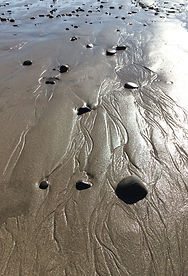







Stefanie Robel
Assistant Professor
Fralin Biomedical Research Institute
Virginia Tech School of Neuroscience
Biological Sciences
I don't know about you, but I became a scientist because I was fascinated by biological systems, their elegance, perfection and complexity.
By serendipity more than by design I ended up in Neuroscience.
The beauty of the brain and its cellular components is intriguing to me and I love a challenge, so I started puzzling out what changes when the brain is injured.
Can we use this knowledge to understand how the healthy brain works?
I became intrigued by the sometimes dramatic cell biological and physiological changes that astrocytes undergo in response to brain insult.
In my lab we study this process, astrogliosis - currently in the context of mild traumatic brain injury. We are interested in mechanisms that induce astrogliosis and in the consequences that these adaptations have for neuronal health and cognitive function.
I went straight for an academic career to reach my goal of becoming a lab leader as fast as possible, so that I would soon have the freedom to lead and guide the research that I was so excited about.
I went into the profession with the belief that that I have to work hard to be successful.
I didn't just come up with that by myself. Most scientists who I consider successful work long hours, weekends and can be reached by email day and night. I accepted this life style as the necessary sacrifice to reach the next step on the ladder.
For a while, I was caught up in a lot of maintenance work that needed to be done. I got bogged down by the busy tasks on my long todo lists that didn't move myself anywhere closer to my goal. I did the things that sucked most first and rarely got to the important and enjoyable parts.
For me that is writing, thinking, reading, planning experiments to answer fundamental questions - the “sciency" parts of science.
I approached scientific work from an industrial age mindset, instead of seeing it as a creative endeavor. I thought the more hours I put in, the more output I get.
I managed to burn myself out and lose all the motivation that I once had for science.
After I hit my personal low in attitude and motivation about 2 years into my postdoc, I discovered a way to view and do things differently, to enjoy my work as important part of my life, to get more done in less time while moving my career forward faster.
I became a personal development and leadership nerd, initially to increase my competitiveness and later because I realized that I could use these strategies and tools to create a happier, balanced life AND increase my levels of success.
Really, you can have it ALL!
As I became better aligned with who I truly am at my core rather than worrying about who I "should" be, I discovered I wasn’t done with science yet.
My passion for the brain’s beauty and mysteries rekindled as I worked on opening up, on being more authentic, on undoing the dysfunctional programing that so many of us in academia suffer from.
I mean, I know that sounds crazy but I started having fun!
Now that I AM a lab leader I enjoy helping others who, like myself, love academia but are unwilling to accept constant overwhelm, exhaustion and stress in their lives.
I trained as a life coach to help other academics to achieve similar results.
My big mission is to change the academic culture from negativity, chronic stress and overwhelm to one where people express their unique brilliance AND live a fun, joyful, happy life by bringing leadership training along with positivity to our community.
I'd love for your to be part of this community. Join our closed Facebook group Team Leadership in Research. This is where we support each other and train academics at all levels from undergraduate student to principle investigator in the art of leadership. You'll have to answer a few questions about our take on leadership and the challenges we are facing. Don't let this keep you from joining!
In my lab, I strive to empower the young scientists to live and work at their full potential in a self-actualized, peaceful and balanced way.
When I am not in the lab, I enjoy taking my dogs for hikes in the beautiful Appalachian mountain and roaming the trails on horseback. Practicing yoga is a great way for me to find balance, especially during more intense work periods.
I love to travel, to visit new places and learn about other cultures.
AWARDS & HONORS
-
Chair, Executive Board UAB Postdoctoral Association, June 2014-May 2015
-
Research Award, Alzheimer's of Central Alabama, 2013-2014
-
Research Fellowship, American Brain Tumor Association, 2013-2015
-
Research Fellowship, Epilepsy Foundation, 2012-2013
-
Emerging Scholar a, Civitan International Research Center, 2011
-
Postdoctoral Scholar Award, University of Alabama at Birmingham, 2011
-
Research Fellowship, German Research Council, 2011-2012
EDUCATION
-
Department of Neurobiology, University of Alabama at Birmingham: Postdoctoral training
-
Institute for Physiological Genomics, Ludwigs-Maximilians University and Institute for Stem Cell Research, Helmholtz Zentrum München: Doctoral Studies (PhD), Neurobiology
-
Max Delbrück Center for Molecular Medicine: Master's Thesis, Molecular Medicine
-
Humboldt University: Master of Science, Biology, Molecular Biology and Genetics
-
Potsdam University: Bachelor of Science, Biology